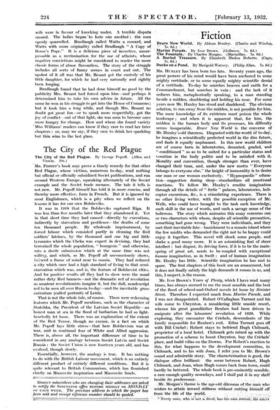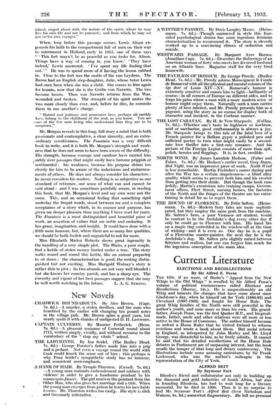Fiction
7s. 8d.) Ducks on a Pond. By Marigold Wainey. (Philip Allan. 7s. 6d1
MR. HUXLEY has been born too late. Seventy years ago, the great powers of his mind would have been anchored to some
mighty certitude, or to some equally mighty scientific denial of a certitude. To-day he searches heaven and earth for a Commandment, but searches in vain : and the lack of it
reduces him, metaphorically speaking, to a man standin,g beside a midden, shuddering and holding his nose. For some years now Mr. Huxley has stood and shuddered: The obvious solution, to run away from the midden, is not possible for him: The mere knowledge of its existence must poison the whore landscape ; and when it is apparent that, for him, the midden is the human body and its processes, his difficulty seems insuperable. Brave New World is the converse of Mr. Huxley's old theorem Disgusted with the world of to-day, he imagines a scientifically perfected world in the dim future, and finds it equally unpleasant. In this new world children are of course born in laboratories, decanted, graded, and conditioned " so as to be suited for a particular status and vocation in the body politic and to be satisfied with it. Morality, and .convention, though stronger than ever, have changed their tune, and, under the new motto " Everyone belongs to everyone else," the height of immorality is to desire one man or one woman exclusively. " Hypnopaedic." educa- tion—suggestion during sleep—standardizes all emotional reactions. To follow Mr. Huxley's erudite imagination through all the detaiLs of " feelie " palaces, laboratories, heli- copter excursions, be., is a stimulating experience. There is no other living writer, with the possible exception of Mr. Wells, who could have brought to the task such knowledge, such skill in the use of words, and such a savage sense of the ludicrous. The story which animates this essay concerns one or two characters with whom, despite all scientific precaution; something had gone wrong. They were individuals, and they met their inevitable fate—banishment to a remote island where the few misfits who demanded the right not to be happy could enjoy it together. This novel will shock some people, and shake a good many more. It is an astonishing feat of sheer intellect : but disgust, its driving force, if it is to be the main- spring of great art, needs to be coupled with exceptional human imagination, as in Swift : and of human imagination Mr. Huxley has little. Scientific imagination he has and to spare. The first chapters of this book are an amazement, but it does not finally satisfy the high demands it rouses in us, and this, I suspect, is the reason.
Mr. Ivor Brown's Years of Plenty, which I have read many times, has always seemed to me the most sensible and the best of the flood of school-and-Oxford novels let loose by Sinister Street. Therefore I expected much from Marine Parade, and I was not disappointed. Robert O'Callaghan Tarrant and his wife come to Cheynton, a mouldering little seaside resort, whence his great grandfather Reuben had been driven to emigrate after the labourers' revolution of 1829. While exploring, they encounter the Crichels, descendants of the family responsible for Reuben's exit. Edna Tarrant goes off with Bill Crichel ; Robert stays to befriend Hugh Chihnark, proprietor of a local hotel. Chilmark gets mixed up with the promotion of a scheme to boost Cheynton, buy the Crichels' place, and build villas on the Downs. For Robert's reaction to this, for what happens to the development committee, to Chilmark, and to his wife-Joan, .I :refer you to Mr. Brown's sound and admirable story. The characterization is good, the dialogue often brilliant: the scene between Robert, Hugh Chilmark, and Joan, when Hugh comes back from town, could hardly be bettered. The whole book is pre-eminently sensible, a rare enough quality nowadays, and I shall put it in my shelf beside its predecessor. , --Mr. Morgan'sttherile is the age-old dilemma of the man who wishes to attain inward stillness Without .cutting .hiMself off from the life of the world. "Every man, who ie not-a deviLlisa his civ-rii ietreai, fill island, ringed about with the waters of the spirit, where he may live his own life and not be pursued ; and from which he may set Out Whig own voyages."
When, long before this passage occurs, Lewis Alison ex- pounds his faith to the compartment full of men on their way to internment in Holland, early in 1915, one of them says " This fort mayn't be as peaceful as you looks for, Alison. Things have a way of coming in, you know." They have indeed,' Lewis answered. ' I've spent my life finding that out.' " He was to spend more of it having the lesson rubbed in. Close to the fort was the castle of the van Leydens. The Baron had an English step-daughter, Julie, whose tutor Lewis had once been when she was a child. She comes to him again for lessons, now that she is the Griifin von Narwitz. The two become lovers. Then von Narwitz returns from the War, wounded and broken. The strength of his spirit unites the 'two more closely than ever, and, before he dies, he commits 'them to one another's charge.
" Hatred and jealousy and possessive love, perhaps all earthly love, belong to the childhood of the soul, as you know. You are a.e of the few men living who understand that they are to be outgrown."' Mr. Morgan reveals in this long, full story a mind that is both passionate and contemplative, a clear sincerity, and an extra- , ordinary sensitiveness. The Fountain was a very difficult book to write, and it is both Mr. Morgan's strength and weak- 4ness that he does not seem to have been aware of the difficulty. His strength, because courage and candour have carried him safely over passages that might easily have become priggish or sentimental : his weakness, because his purpose shines too clearly for him to be aware of the indecisions and embarrass- ments of others. He does not always consider his characters : he never considers his readers. Nothing is so subjective as our standard of reticence, our sense of what can and cannot be said aloud : and I was sometimes painfully aware, in reading this book, that Mr. Morgan's level and my own were not the same. This, and an occasional feeling that something rigid underlay the limpid words, stood between me and a complete acceptance of a story which, in its essence and purpose, has given me deeper pleasure than anything I have read for years. The Fountain is a most distinguished and beautiful piece of work, an assertion of values that are noble and enduring. It has grace, imagination, and insight. It could have done with a little more humour, but, where there are so many fine qualities, we should he both foolish and ungrateful to ask for more.
Miss Elizabeth Madox Roberts shows great ingenuity in the handling of a very simple plot. The Blairs, a poor couple, find a'kettle of stolen money buried under a tree. The story walks round and round this kettle, like an animal preparing to sit down ; the characterisation is good, the writing distin- guished but not exciting. Miss Marigold Watney's story is rather thin in plot ; its two strands are not very well blended ; but she knows her country parish, and has a sharp eye. The sincerity and vigour of her best passages suggest that she may be well worth watching in the future. L. A. G. STRONG..







































 Previous page
Previous page